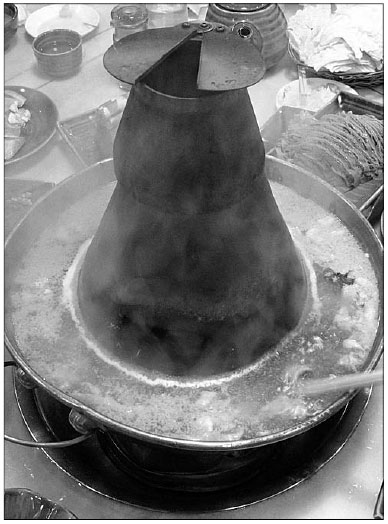Delicacies
A load of delicious tripe
Updated: 2011-03-27 07:30
By Ye Jun (China Daily)
|
Xinyide Baiyeju's signature dish, traditional Beijing-style hotpot with tripe, or baiye, that is briefly blanched. Ye Jun / China Daily |
 |
Beijing
Chinese cuisine is known for its innovation, especially when it comes to the off-cuts of meat, as Ye Jun reports.
Many expatriates in Beijing may gaze upon a plate of beef tripe with great misgiving, but what they are looking at is probably one of the best-known signature dishes of the capital.
Baiye, the inner part of the beef stomach, is used in a popular specialty known as baodu, flash-poached tripe served with a sesame-paste sauce.
Given its reputation, I had still to be convinced that it can be delicious. The tripe I had tried was either too hard, or tasteless. That impression changed, finally, when a friend invited me to a restaurant named after the food - Xinyide Baiyeju (House of Baiye).
The restaurant offers mostly traditional Beijing-style hotpots, and tripe or baiye is their signature dish. Baiye literally means "hundred leaves" referring to the multiple layers of the tripe. There are two kinds offered here, the everyday variety at 26 yuan ($4) a plate, and a specialty plate at 28 yuan a plate, both with 300 grams of tripe.
The tripe is dipped into the hotpot for no more than 10 seconds and is fantastically tender and crisp, eaten with the sesame dip. According to the restaurant owner, the secret is that the tripe is freshly prepared, within 24 hours.
While waiting for the big bronze hotpot to come to a rolling boil, there are appetizers to while away the time. Tender turnip slivers are crisp and fresh, while the smashed cucumber batons soak up a tart and tasty dressing. The white-boiled lamb head cold cut is another winner.
Besides the specialty tripe, the restaurant offers a selection of fresh and frozen beef or lamb, shaved into wafer rolls. An indicator of the quality of the meat is the lack of foam floating in the cooking broth; the resulting base soup is very clear.
Other good options to go with the hotpot are frozen bean curd, enoki mushrooms and green vegetables. After that, get a plate of nice, warm sugar cakes for dessert.
The restaurant, like many others in the capital, is facing a shortage of staff and if you arrive at the peak hours, service may be slow. The menu is only in Chinese, but everything is illustrated in color and visitors can still point their way to a good meal.
The average bill is 60 yuan a person.
Specials

Tea-ing up
More turning to Chinese tea for investment opportunities like vintage wine

A cut above
The ancient city of Luoyang is home to a treasure trove of cultural wonders.

Rise and shine
The Chinese solar energy industry is heating up following recent setbacks in the nuclear sector
